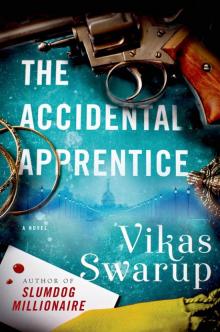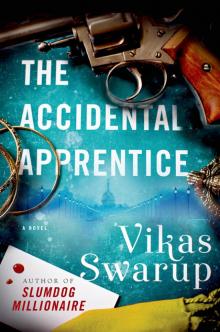- Home
- Vikas Swarup
The Accidental Apprentice: A Novel Page 5
The Accidental Apprentice: A Novel Read online
Page 5
But today at least I can keep them at bay. My mind is still buzzing with all the possibilities unleashed by Acharya’s offer, and the house is too small to think in. So I head down to the garden just outside the colony gate. It is not really a garden, just a patch of earth contained by a low brick wall, with a few shrubs and fruit trees scattered around. During the day the neighbourhood kids use it for their cricket matches, causing quite a racket, but at this time of night it is deserted and silent. I park myself on one of the wooden benches. The night air is nippy and the ground is damp beneath my feet. I draw my woollen shawl more tightly around my shoulders, hugging the warmth closer.
I have been sitting for less than a minute when Kishore Kumar begins to serenade me with a song from the film Amar Akbar Anthony:
My name is Anthony Gonzalves.
I am alone in the world.
My heart is empty, my home is also empty,
In which will live someone very lucky.
Whenever she thinks of me, she should come visit
Palace of Beauty, Love Lane, house number 420!
I feel a warmth in my face, as if a faint flush of crimson has crept into my cheeks. I know that the legendary singer has not returned from the dead. And neither does he live in house number 420. The melodious voice belongs to Karan Kant, resident of apartment B-35.
Karan moved into the LIG Colony a month after we did. Over the last fifteen months he has become much more than a neighbour to me. He is an orphan with no family, and works as a call-centre agent in Indus Mobile, India’s third-largest cellular service operator. Though he is twenty-five years old, his boyish looks make him appear five years younger. With his above-average height, perfectly sculpted body, chiselled, clean-shaven face and curly hair, he is easily the most handsome man in Rohini, if not in Delhi. Add to that his crinkly smile and dreamy eyes and it’s enough to make schoolgirls swoon. Not just schoolgirls, but even the menopausal housewives in our colony are smitten by him. They find one excuse or another to come to the balcony in the evenings just to catch a glimpse of him returning from work. But Karan seems to have eyes only for me. I do not know what he sees in me. Perhaps he regards me as a kindred spirit. We are both high-potential underachievers, bruised by life, buffeted by fate. Of all the people in the colony, he has chosen me to be his confidante. We are each other’s sounding board, staunchest supporter and most honest critic.
It is still too early to give a name to our relationship. Suffice it to say that he is my soulmate, my strength, my rock. Sometimes I look upon him as a brother; at other times as a trusted companion; and once in a while – dare I say it? – as a boyfriend. There is always the vulnerable note of courtship in his actions, though he tries to hide his feelings behind a flippant exterior and acts of buffoonery. He is a hugely talented mimicry artist who can impersonate the voice of just about anyone, from the actor Shahrukh Khan to the cricketer Sachin Tendulkar.
For all his droll playfulness, there is an undercurrent of sadness in his eyes. I have often caught him looking at me with a tortured, haunted expression. At times like these I can almost touch the raw loneliness in his heart, and I bleed in sympathy. He is a true clown, making others laugh while crying silently inside.
‘Why so serious, Madam-ji?’ he says as he plonks down next to me.
‘It’s been a really crazy day.’ I exhale.
‘Did you (a) win a lottery, (b) get robbed, (c) get a job offer or (d) meet a celebrity?’ He is mimicking Amitabh Bachchan asking a question on Who Wants to Be a Millionaire?.
‘All of the above,’ I reply.
He narrows his eyes. ‘Then would you like to phone a friend?’
It seems he has read my mind. So much has happened in the last twenty-four hours that I can’t keep it bottled up any more. I need to talk it over with someone, get it off my chest. And I can’t think of anyone better than Karan. I am mindful of Acharya’s stern admonition about maintaining strict confidentiality, but, if I can trust anyone to keep a secret, it is the man sitting next to me. I gaze into his soulful eyes and feel the world come to a standstill. ‘You won’t believe what I’m about to tell you.’
I tell him everything, starting with that chance encounter with Acharya in the temple to Deenu Uncle’s phone call, the theft of the bangles, the scene in the showroom with Choubey and the final meeting with Acharya in his office resulting in the unexpected windfall of two lakh rupees in hard cash.
Karan listens to me in rapt attention. Then he lets out a long, low whistle. ‘Boy, this is a story for my grandchildren!’
‘So you think Acharya is serious about making me his CEO?’
He chuckles. ‘Are you nuts? This is a scam if I ever saw one. Nobody suddenly offers a complete stranger a tenbillion-dollar company on a platter.’
‘But I researched Acharya. He looks to be above board.’
‘So does every conman before he gets caught. Big Bull Harshad Mehta was hailed as a financial wizard before he brought down the entire stock market.’
‘But what can Acharya hope to get from me? I don’t have any money to invest in his company.’
‘Maybe he has a thing for dusky beauties.’
‘He doesn’t seem like a lecher. And I’m no Bipasha Basu.’
‘Is there any chance at all that you might be his longlost illegitimate daughter?’
‘Don’t be facetious. This is not a Bollywood film.’
‘But I can already visualise the scene.’ Karan holds up his hands like a director framing a shot. ‘He calls you to his house late at night. You don’t find him there, but you discover his wife lying in a pool of blood. She has been shot dead. And the gun that killed her has your fingerprints on it. Then you realise that all this was part of an ingenious plan to get rid of his wife and pin the murder on you.’
Before his hyperactive imagination conjures up yet another gruesome scenario, I cut him off. ‘Acharya doesn’t have a wife. End of conspiracy.’
‘Then there must be some other devious design. It is common knowledge that Acharya loathes his twin brother Ajay Krishna Acharya. Premier Industries is the ABC Group’s biggest competitor. What if Acharya is making you a pawn to get to his twin?’
‘Acharya didn’t utter a word about his brother. And what am I, a stupid fool who will willingly become someone’s pawn?’
‘I’m not blaming you. It is a basic rule of human nature that the promise of unexpected wealth short-circuits both intelligence and common sense. That is why we have all these Ponzi schemes, chit-fund scams, timber-plantation frauds. I see it happen every day in the call centre, with gullible customers sucked into dubious deals floated by fly-by-night telemarketers who always manage to fly the coop before the cops show up.’
‘There’s also something called taking a risk. Only those who risk going too far can possibly find out how far they can go.’
‘Did Acharya say this?’
‘It was T. S. Eliot. And I’m not even the one taking the risk here: Acharya is. He’s the one betting on me. How could I pass up the opportunity of a lifetime? For the first time, I sense a glimmer of hope about my future.’
‘Ha!’ he reacts dismissively. ‘Hope is a recreational drug, giving you an artificial high based on a dosage of unrealistic expectations. What you need is a reality check.’
‘And what you need is a dose of sunshine. Why do you always have to be so negative?’
‘Because I care for you, and I have a bad feeling about this, Sapna. You should never have taken Acharya’s money.’
‘I had no choice.’
‘I just hope you don’t end up regretting it. There’s bound to be a quid pro quo. And yet you know nothing about his so-called seven tests. What do they entail? How will they happen? When will they happen?’
‘Yes, I’m also a bit apprehensive about the tests.’
‘Let me tell you a little fable, Sapna. Once upon a time, there was a man who was desperate to be taller. So he prayed to God for twenty years and God finally granted his wish.
But there was a condition. God said “I can make you taller, but, for every inch I add, five years will be deducted from your life.” The man agreed. So God made him three inches taller – and the man died instantly. Moral of the story: never enter into a deal without knowing all the facts.’
‘I have no intention of taking any tests. I’ll promptly fail the first one. And get to keep the two lakhs. End of story.’
‘If only it were that simple. A man like Acharya must have thought about this very carefully before he approached you.’
Karan’s morbid, unrelenting cynicism grows on me like a fungus. By the time I sit down with Ma and Neha for dinner, I am convinced that signing that contract with Acharya was the worst mistake of my life.
Whenever I am disturbed, I turn to poetry for solace. So, after dinner, I take out the secret black diary in which I have been jotting down my thoughts and feelings since I was nine. As I flick through its well-thumbed pages, my eyes settle on a short poem titled ‘Tomorrow’. It is dated 14 April 1999, when I was a callow, eleven-year-old schoolgirl. Perhaps because it was penned in a happier, simpler time, it is just the tonic I need. This is what I wrote:
Hope is a shining sun
That brightens every morrow.
Love is a mighty wind
That blows away the sorrow.
The future is an empty road
And I’m not afraid of tomorrow.
The First Test
Love in the Time of Khap
‘Welcome, sir, would you like to take a look at our range of big-screen TVs? We have some fantastic offers at the moment.’ I smile at the customer with all the ingratiating enthusiasm of a presenter on the Home Shop channel.
It is Saturday, 18 December. A week has passed since my rendezvous with Acharya and my mind has been full of worry. All my life I never feared examinations, but just thinking about Acharya’s tests causes a weird roiling in the pit of my stomach. Mainly because I know nothing about them, and the uncertainty is stressing me out. On top of this, the showroom has become a madhouse. World Cup fervour is reaching fever pitch and our TV sales are going through the roof. This morning a frisson of excitement went through the employees when we were told that Bollywood actress Priya Capoorr will visit the store two weeks from now. She is the brand ambassador for Sinotron Corporation and will be promoting their latest TV models.
There have been some other developments as well. We have a new cashier called Arjun Soni, a fat slob who constantly flips peanuts into his mouth and answers questions with questions. Neelam, one of the salesgirls, is quitting next month to get married. The boy is a Nonresident Indian from Stockholm. She is excited about going to Sweden, a country about which I know next to nothing.
In the afternoon the manager calls me to his cubicle. ‘Sapna, I was just checking your sales figures. You are top of the list again,’ he beams at me. His forced, yellow, toothy grin reminds me of an old Hindi film villain called Jeevan, putting me instantly on my guard. Madan smiles only when he wants to coax a favour out of an employee, like requiring us to stay overtime or come to work on a Sunday.
‘You remember Mr Kuldip Singh, the man who bought a truckload of goods last week?’ he continues.
‘You mean that farmer from Haryana?’
‘Yes, yes.’ Madan nods. ‘Well, he called today to say that no one in his household knows how to operate any of those appliances. Now he wants someone from the shop to come to his village and explain all the operating instructions. You understand?’
‘Yes, so why don’t you send one of the sales boys?’
‘That’s the problem,’ Madan sighs. ‘He wants only you. Apparently you impressed him no end. So here’s the deal. We want you to go to his village tomorrow, and show him how the TV and the washing machine and the music system and DVD player work. We’ll bear all your travel costs and, on top, you’ll receive five hundred rupees for expenses.’
‘I’m not wasting my Sunday just for five hundred rupees.’
‘Think of it as easy money. I’ve found out that it takes just three hours to Chandangarh village. You could easily go in the morning and return by evening. Is it okay with you?’
‘It’s not okay. How can you ask a single woman to go all alone to a remote village?’
‘I understand, I understand.’ Madan waggles his head. ‘But Gulati sahib will consider this a personal favour. Please, just this once,’ he pleads.
‘I can’t go this Sunday,’ I say with a grave shake of the head. ‘It is Alka’s birthday.’
‘Who is Alka?’
‘My sister, who died two years ago.’
‘Why do the dead have to interfere with the affairs of the living?’ he mutters under his breath, before nodding resignedly. ‘Theek hai. Can you at least go on Monday?’
‘Yes, that should be possible. But I’ll not stay longer than a few hours in that village. At what time will the taxi report to my house on Monday?’
‘Taxi? Who do you think you are? Priya Capoorr? You’ll take a bus, understand?’
I feel like telling him to go take a hike but there’s only so far you can push Madan and I think I’ve pushed him close enough today.
If ever I get to become the CEO of the ABC Group, the first thing I’ll do is buy up Gulati & Sons, and make Madan the office sweeper. For now, however, I simply nod and swallow my pride.
* * *
An air of deep unsettling gloom hangs over the house. The cruel and mocking stillness of fate. Today is Alka’s birthday. She would have been seventeen today. Mother dabs at her eyes. I have a lump in my throat that refuses to go away. The mood of homage and penitence wraps me in its suffocating embrace.
There has not been a single day in the last two years when I have not thought of Alka. The dead don’t die. They simply transform into phantoms, hovering about in the air, preying on our thoughts, invading our dreams. Alka’s absence haunts me every day, but more so today. There’s something particularly damning about being alive on your dead sister’s birthday.
As I sit staring at her photograph, consumed by survivor’s guilt, memories of our time in Nainital come rushing back to me.
We used to live in Number 17, a large, four-bedroom house on the campus of Windsor Academy, an all-boys residential school, where Papa was the senior teacher for mathematics. Built in the 1870s, the school is like a Victorian fortress sprawling over a hundred acres of land, complete with crenellated turrets, stone parapet spires and angels and gargoyles embedded in the Gothic façade of the main building. Perched atop a low green hill, it is surrounded by mist-clad mountains and oak, pine and deodar forests. From our house we could even see the eye-shaped Naini lake, glimmering darkly.
Papa had a long association with the Academy, beginning his teaching career in 1983 and working there continuously for more than twenty-five years. We were a middle-class family, leading a quiet, middle-class existence. The atmosphere in our house was one of discipline, responsibility and few extravagances. In many ways it was an idyllic life of peaceful solitude and diligent study, punctuated by summer storms, lazy boating trips on the lake and winter excursions to our ancestral home in Hardoi.
Though we grew up together in the same house, we three sisters had very different personalities and approaches to life. I was the shy, bookish nerd. Neha was the snobbish show-off. And Alka was the free spirit who marched to her own tune. She had a great sense of humour and found joy in even the smallest things. She was boisterous, vivacious, spontaneous, outrageous, even bordering on rash at times. But the moment she flashed her impish smile and said, ‘Kamaal ho gaya!’ all was forgiven. She was the apple of my eye, the life of the party, the heart of our family.
We were schooled in an environment of regimented duty, where rules were more important than feelings. Alka, Neha and I attended St Theresa’s Convent, an exclusive English-medium boarding school for girls run by Catholic nuns. We three were non-fee-paying day girls, a privilege afforded to us by virtue of Papa’s employment at Windsor Academy, which had a
reciprocal arrangement with the Convent. Sister Agnes, our tyrannical principal, had very clear ideas on the things we were allowed to do as girls, what we could not do and what we must never do. At home, our father enforced the same strict code of conduct, including an eight p.m. curfew. Without discipline, there is only anarchy, Papa used to say. Being a mathematics teacher, he had reduced his world to the binary of black and white, good and bad. There was no allowance for grey in his universe.
He had also mapped out the futures of all three of his daughters. I, the studious one, was to become a civil servant; Neha, the beautiful one, was to pursue a career as a TV journalist; and Alka, the compassionate one, was to be a doctor.
Like an obedient daughter, I did what Father expected of me. I excelled at school and then joined the BA course at Kumaun University. Even though my subject was English literature, I read up everything that I could lay my hands on. From the life cycle of a moth to the fuel cycle of a nuclear power plant, from black holes to brown clouds to cloud computing, I hoovered up every bit of arcane information to hone my general knowledge, which is essential for success in the civil services exam.
My father’s most important rule inevitably had to do with boys. A few years ago, a fellow teacher, Mr Ghildayal, had been singed by his eighteen-year-old daughter Mamta’s secret romance with the school head boy, which had resulted in an unexpected pregnancy, and Papa was petrified by the prospect of a similar scandal attaching itself to his family. ‘If I catch any of my daughters even so much as looking at a boy on campus, I’ll take off her hide,’ he would threaten us. But he couldn’t prevent the boys from looking at us, or, rather, at Neha and Alka. They were the prettiest girls on a hormone-filled campus, where every day brought a new sexual awakening to some tormented soul. The boys were mostly spoilt rich kids from places like Delhi, Mumbai and Kolkata who had been banished by their parents, and were intent on making full use of their new freedom. Windsor Academy prided itself on being an academic utopia. In actual fact, it was a den of corruption and degradation. All kinds of pornographic materials and alcoholic drinks circulated freely on campus. There were even dark whispers of drug abuse and prostitute visits.

 The Accidental Apprentice: A Novel
The Accidental Apprentice: A Novel Six Suspects
Six Suspects Q & A
Q & A The Accidental Apprentice
The Accidental Apprentice